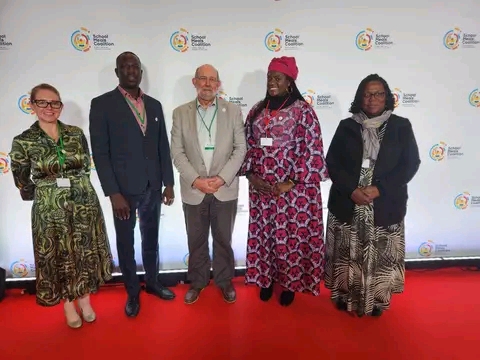UK Research Consortium Commits to Support Zambia in Assessing School Meals Program Impact
In a significant move, the Research Consortium for School Health and Nutrition, based in the United Kingdom, has pledged its support to Zambia in conducting research to gather evidence-based data on the impact of the School Meals Programme.
In a statement Issued by Naomi Mweemba, First Secretary Press of Zambian Embassy, Paris, this commitment was announced during a bilateral meeting held between Ms. Lillian Kapusana, the Permanent Secretary in the Office of the Vice President, accompanied by Mrs. Malalu Mulundika, the Director of School Health and Nutrition at the Ministry of Education, and the research consortium.
The meeting took place on the sidelines of the School Meals Global Coalition’s inaugural summit in Paris, France.
Ms. Kapusana, who also serves as the Deputy Chairperson of the Standing Committee of Permanent Secretaries on Nutrition, sought to establish a strategic partnership with the research institute to systematically document Zambia’s Homegrown School Meals Programme using scientific data.
Highlighting the importance of data, Ms. Kapusana emphasized that having robust research findings is crucial as Zambia aims to expand its feeding program to the remaining 46 districts.
The Permanent Secretary underscored that the school feeding program has become a flagship initiative in Zambia, offering valuable lessons for other countries in the transformation of agrifood systems pathways.
She noted that since the introduction of free education by President Hakainde Hichilema, there has been a notable increase in school enrollment. Therefore, it is essential to mobilize international support based on data as the country works toward extending the coverage of the program.
In response, Professor Donald Bundy, Director of the Research Consortium for School Health and Nutrition, wholeheartedly committed to supporting Zambia’s proposal for research on the School Meals Programme.
He praised Zambia’s remarkable success story with the Homegrown School Meals Programme and called for the immediate formation of a team consisting of researchers and nutritionists dedicated to the welfare of children.
This team will lay the foundation for the research by initially conducting a case study of the program as an immediate intervention.
Professor Bundy expressed his interest in establishing a strong collaboration with nutritionists in Zambia who share a deep concern for the well-being of students.
The School Meals Global Coalition Summit, which convened for the first time on October 18, 2023, in Paris, has called on nations to ensure that every child worldwide has access to school meals by 2030.
This landmark initiative, supported by 90 Member States and 100 non-governmental organizations, is backed by the United Nations’ World Food Programme. Its primary objective is to enhance and extend School Meals Programs globally.
French Minister of State for Development, Francophonie, and International Partnerships, Chrysoula Zacharopoulou, officially inaugurated the summit on behalf of President Emmanuel Macron.
She acknowledged the profound significance of the School Meals Programme as a public health policy that brings social justice and equality to all learners.
Meanwhile, Cindy McCain, the Executive Director of the World Food Programme, made a momentous announcement during the summit, pledging her organization’s contribution of 300 million euros to the coalition.
This substantial contribution will serve to advance and expand the feeding program’s coverage worldwide.



